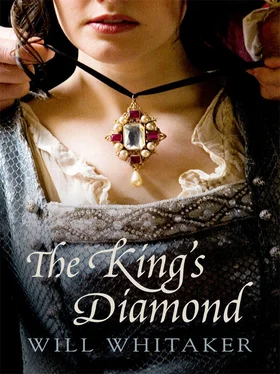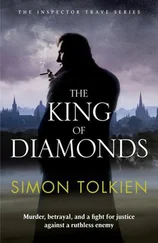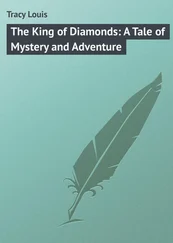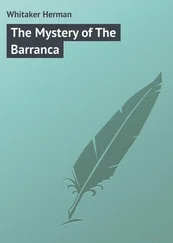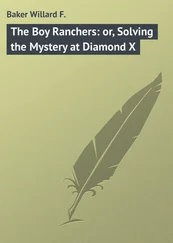There was another way. I could turn south, and head for Rome. Rome: opulent capital of Christendom, where the finest goldsmiths, artists and dealers in luxuries flocked to make their name and fortune, and supply the endless appetites of His Holiness, Pope Clement VII, his cardinals and nobles. Rome: the seat of a mighty temporal power, for Pope Clement held absolute sway over all central Italy, as well as numerous cities in the north, and commanded Florence through his Medici relations. Rome. Only there would I find the craftsman truly worthy to work on my stones. In my dreams I saw the golden swirls and figures that must surround the gems. I saw something nobler than the common run, something alert and alive, something I had never seen in London.
As I sat, my servant, Martin Deller, paced up and down behind me. He was some ten years my elder, stocky and dark, a useful man with a dagger who had helped me out of trouble more than once. He was also, to my frequent annoyance, the voice of conscience and caution.
‘Please, master! We have had good luck. Let’s leave while we can for home.’
He was right. Plainly he was right. It was a wonder how we had crossed from Venice overland: first past the army of the Pope’s Holy League camped at Cremona, which they had recently won from the Emperor’s Spaniards, then across into the Duchy of Milan where this war had first begun. This was Imperial territory. We found the farms broken up, the fields burnt. The Emperor’s army, starved of pay and plunder, roved the shattered countryside in bands, robbing travellers of whatever they could get. We had travelled by night and hidden in the day, winning through by a mixture of my boldness and Martin’s sense.
The patch of sun on the wall of the Arsenal opposite had shrunk upwards as far as the parapet. It was drawing towards evening. At sunset the Speranza would sail. Few ships were putting out for Rome in these days of war. If I was to strike south, this would be my only chance. Perhaps she had sailed already. And that was best, I argued to myself: by far the best. The time had come to call enough, and turn for home. I faced Martin. I was on the point of telling him to unpack the trunk again, and order horses for tomorrow and a guide for the journey inland.
‘Well, master?’
A sudden, sick rage swelled up in me. Was I to give up now on the triumph I had sworn I would have, all those months before, when I folded my bills of exchange into the casket round my neck and climbed the boarding ladder on to our family ship, the Rose? Now, when I had a casket of gems the like of which had scarcely been seen? Was I to betray them? My blue diamonds of Bengal called out to me, my sapphire that was the colour of pale skimmed milk sighed to me, my fiery garnets and the great dark ruby flashed with rage. This venture had never been for those easily daunted by fears. No, there comes a time when the stakes double: a time when you must either gamble and go on, or else give in, and admit you should never have played at all.
I stood up briskly and walked towards the door. My sword was swinging, my hat already on my head. ‘Pick up the trunk,’ I ordered Martin. ‘We are going.’
I walked out of the inn beneath the painted angel with its wings spread, and into the crowds. I could hear Martin’s breath behind me as he struggled to keep pace with my trunk on his shoulder.
‘Wait! Master, please! Will you not consider a little longer?’
I did not look back. I skirted the Arsenal, heading east round the broad bay, a mile wide, that forms the harbour at Genoa. Now that I had decided, I was determined not to lose a moment. I pushed my way through the crowds past the wooden piers where the lesser vessels put in, the lighters and flat-bottomed shallops. Here, winebarrels bumped and thundered, and three men rolled a hogshead up the ramp to the roadway in front of me. I dodged round it with a curse. There was the rich scent of oil, spilling in drops from great jars borne on men’s shoulders, and the stink of hemp, its stiff fibres tied in rolls, ready for the rope-makers that twist the long cables in the alleys behind the port. As I hurried on, a mournful chanting struck up from the belly of one of the war galleys out across the bay. Strange and sad, this Mahometan song of the Turks chained at their oars: for that is the rule of the sea, that when a Christian ship lays hold of a Muslim, all her crew become slaves, and when they take a ship of ours we suffer the same.
At the fish market I stopped, impatient, while Martin caught up, the trunk bobbing above men’s heads in the thick of the crowd. Red mullet stared up at me, glass-eyed, out of open crates, and a woman in a white linen bonnet chopped the heads from eels and cast them down on the stones, where gulls swooped and flew off with them, crying. Music burst from one of the taverns, a fiddle and pipes, and I heard the clack of the dice, a harlot’s laugh, the slap of cards on a table. As Martin came out from the press, I turned and hurried on.
West over the hills the sun broke out briefly through the clouds. It was close to setting. At the last of the wooden piers grain was being landed, passed from shoulder to shoulder in sacks and poured out into bushel measures, sending up clouds of chaff. The men laughed and joked at their work. No one could say how long this plenty might last, or when the galleys of the League might close the sea once more and attempt to bring Genoa to obedience through starvation. I pushed past, bounding up the six stone steps on to the Mole, whose curving arm reached out into the deep water of the bay. The wind blew with full force here, and I reached a hand up to steady my hat. It was a soft bonnet of black Lucca velvet, which had in it a gold medal of the Virgin and Child, in the latest aristocratic fashion. I had paid eighty Genoese ducats for this medal. But it was more than a costly ornament. It was the guiding star of my voyage.
All along the Mole on the sheltered side towards the harbour lay the great ships, bound on far and weighty ventures. Their masts rose tall, clustered like forest trees, flying the flags of all those nations aligned with the Empire. There was the red cross of Genoa, the black and white of Siena, the red, white and yellow tricolor of Spain. The wind made the ships pull on their ropes and the waves slap against the stone. I ran along the Mole, hunting in agitation for the gilded names on their sterns.
I had sat last night in the Angel with the Speranza’s owners, a pair of Genoese brothers named Piero and Federico Fieschi. I had bought them wine and discussed terms of payment for this voyage: ten ducats they asked, for the two hundred and fifty sea miles to Rome. All risks were my own. Piero had looked at me in question. The price was high: some thirty shillings for a journey that should have cost less than ten, even supposing I needed cargo space in the hold. I told them the sum was acceptable; but I could answer at that time neither no nor yes. They went away displeased. ‘Remember,’ Federico warned me, ‘we sail tomorrow, without fail.’
Ahead, men shouted from the decks of one of the ships. Her yards were raised high and clear, slanting out over her sides, and a wooden crane swung goods out from the Mole and down into her holds. Plainly she was loading up to depart.
On the quay Piero Fieschi was standing among a band of five or six men. They had the air of old established merchants, all of them, with grizzled beards and gowns trimmed with rabbit fur and sable. They thought nothing of standing there in that chilling wind, watching with serious eyes as every last bale and crate was winched up from the Mole. Their grave faces showed they knew the risks, putting to sea in times such as these. Doubtless they had prepared well in advance. They would have their servants on board, numerous and well armed. No doubt they had insurance too for their valuables, so that, even if they perished, their heirs would profit. It gave me a sudden sense of my own vulnerability. I had taken none of these precautions. I realised, too, the hastiness and lack of dignity of my entrance. Still out of breath, I swept off my hat and bowed.
Читать дальше
